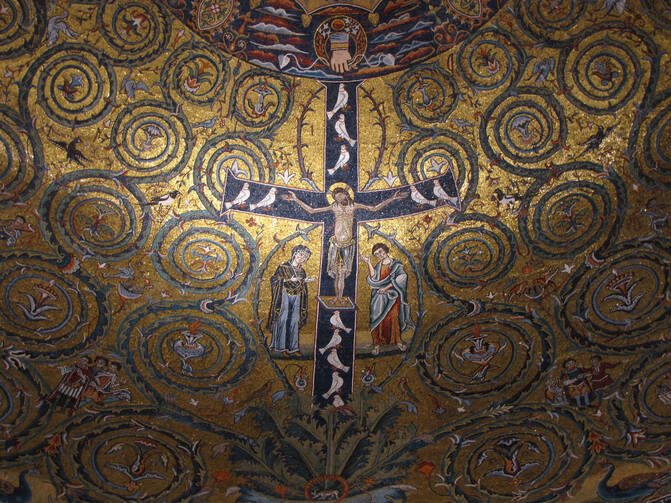A Homily for the Fifth Sunday of Easter
Readings: Acts 9:26-31 1 John 3:18-24 John 15:1-8
Most of life does not even make its way into consciousness, and the little that does does not dwell not long. How much of yesterday—literally yesterday—is already lost without a trace?
Perhaps what memories do remain with us, as the years pass, is a work of grace. Some of it is consequential, at least by the measure of our small lives. Most of it is momentary, though even some of that solidifies in the amber of memory. Does the Lord want us to remember both the momentous and the minor for reasons not to be revealed until we see God in the flesh?
I was a boarding student in high school. Not something I would recommend to most, yet I thrived in those years. But one evening at supper, for reasons I cannot recall, I was forced to look for a seat at a table of older students. They were laughing at an anecdote being shared by an engaging student who, to the extent that he noted it, resented the interruption my appearance created. Without a thought, almost without a pause in presentation, he threw out, “Get lost, Klein.”
I did, and fast! He had pushed two of my emotional triggers: he had told me to get lost, and he had called me by my surname. That was common enough, for students and teachers, in an all-male school. I suppose the practice of calling one by their last name was meant to toughen. I always found it demeaning, distancing.
I do not remember where I retreated for my meal, but an hour later, I was next door at the girls’ high school, rehearsing the comic role of Harry A. Kagan in the play “Up the Down Staircase.” When writing this homily, I had to look up the character I played. As I have said, most of life leaves little trace.
That night I rehearsed with a morosity only a high school sophomore could summon. I had not yet learned that this is not how one asks for help. Yet the caring teacher directing the play asked one of the older girls to take me aside and talk to me. “See what’s wrong with Terry.” He had me with “Terry.” I followed her from the stage.
Sitting on the bleachers, I told her what had happened. She listened sympathetically, and I suppose—because memory is so constricted—said something about life being tough like that and about not drawing our sense of self from the carelessness of others.
I said something about her not understanding what it was like to be rejected. She pulled up her shirt sleeves, showing me two sets of scars, horizontal across her wrists. “I do know what it is like to feel rejected, and if I had known that you need to cut vertically to kill yourself, I would not be here to talk to you about it.”
Does anyone pass through life without being rejected? Is that not an all-too-common vein in the mine of memory?
When Saul arrived in Jerusalem he tried to join the disciples,
but they were all afraid of him,
not believing that he was a disciple (Acts 9:26).
Being knocked from his horse on the road to Damascus had reordered the values and energies of Paul’s life. He got up from the ground a new man, but in Jerusalem the reputation of the old still held sway. Try to imagine what it would be like to give your life to your new Lord—Paul could not have been more all-in—only to be shunned by his disciples. He had been so deeply grafted into Christ but on a different branch of his vine.
St. Luke offers an explanation, but it is not needed. We understand the anxiety of the Jerusalem disciples, and their need to protect themselves. Fear makes most of us do terrible things, like excluding others from our fellowship.
The world has become such a frightening place. We take it for granted that Americans should accuse other citizens of not being patriots, that Christians should refuse to recognize the faith of their fellows: You cannot belong to that political party and be a real American. You cannot be attached to that liturgy and be a true Catholic. You cannot have that sexual orientation and belong in the church.
How small do we think the vine of Christ is?
Some 12 years after that sophomore supper, as a newly ordained priest, I received a call from the same upperclassman who had sent me packing. He was in great distress, and he reached out to “Father Terry.” (To borrow from the Bard, what’s in a name?)
Why was he calling? One of his classmates at the table that night, clearly suffering from a horrific mental illness, had just killed his family and committed suicide.
How helpful was I? Memory will not retrieve what I said. It probably was not much. What I do remember is that he and I needed each other at that moment, and we knew that. If only by a more tender grace of God, we could all learn how much we need each other, no matter how we are tempted to label and limit the other.
O for the grace to reflect and then to ask ourselves, how small do we think the vine of Christ is?








